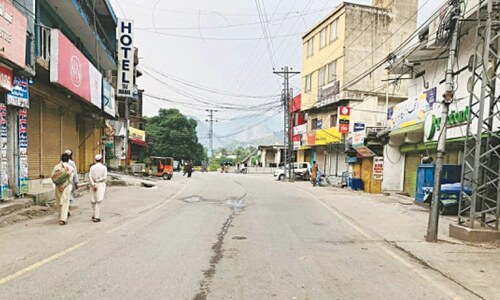ISLAMABAD: In tribute to Sufi poet Bulleh Shah, the Ajoka Theatre presented its famous play, Bullah, to mark his urs (death anniversary) at Lok Virsa on Monday.
Based on the life of Bulleh Shah, the play was written by Shahid Nadeem and directed by Madeeha Gauhar.
First performed in 2001, the play highlighted Bulleh Shah’s journey to becoming a respected scholar and his longing for true inner realisation. Against the objections of his peers, Bulleh Shah became a disciple of Shah Inayat – a famous master of the Qadri Sufi lineage – who ultimately guided his student to his mystical awakening.
Starting off with the death of Bulleh Shah, also known as Abdullah Shah Qadri, and the controversy around his burial, the life and times of the 16th century Syed, who became a discipline of Shah Inayat Qadri – an eminent saint who happened to be an Arian - unfolded.
Punctuated with Bulleh Shah’s poetry, the play was performed remarkably by the troupe. The addition of Bulleh Shah’s poetry to the script, and the idea to tell the story with the help of two narrators were an effective way to avoid monotonous dialogue.
Bulleh Shah was played by Usman Raaj, who also recited his poems beautifully. The Khawer Ali Qawwal group performed qawwalis on Bulleh Shah’s poetry.
The play focused on Bulleh Shah as a symbol of hope and humanism, and a powerful voice for tolerance and love. He promoted a relationship with God that was not oppressive, and allowed people to be religious and also respect other people’s beliefs. He did not see any conflict between his spiritual beliefs and his devotion to music and dance.
The playwright also presented two strategies to confront the tyranny of rulers. While historically inaccurate, the fictional meeting of two Punjabi icons, Bulleh Shah and Banda Singh Bahadur (a Sikh warrior who stood against the Mughals) highlighted two separate but contemporary perspectives.
Their meeting in the play signifies their divergent world views. Where Banda Singh Bahadur believed in bloodshed and taking revenge with violence, Bulleh Shah upheld a spiritual ideology about peace and justice.
Introducing ‘Bullah’ to the audience, Shahid Nadeem, the playwright, said the play was broadly based on events in Bulleh Shah’s life – communicated through poetry, historical records and popular myths – and was ultimately a tribute to the great mystic.
“Bulleh Shah lived in the time of the downfall of the Mughal Empire, characterised by conflict, rebellion, religious and civil strife and absolute ideological and political chaos. Those times were not very different from today,” he said.
After the play was over, Sabiha Umer, an audience member, told Dawn: “Before watching this play I didn’t know about the life of Bulleh Shah.” She had been shocked by the opening scene, where rulers refused to bury Bulleh Shah in his hometown. “It was an injustice to such a great personality, but time proved who was on the right path.”
“Such plays should be performed on a regular basis and also in educational institutions to raise awareness among youngsters about our rich culture and history,” she added.
Published in Dawn, August 31st, 2016














































Dear visitor, the comments section is undergoing an overhaul and will return soon.